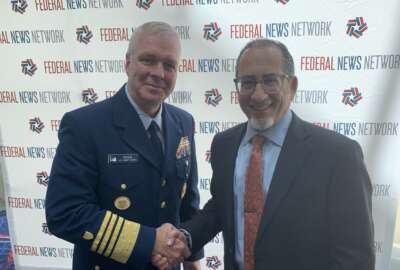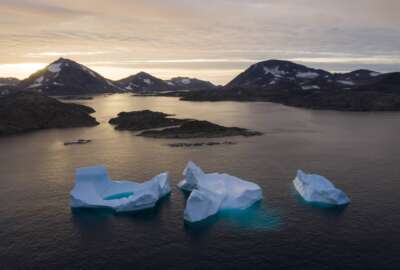
It might be frozen, but the Arctic is not locked down
The Coast Guard has long worked to boost its capabilities of operating in the Arctic, an area of increasing importance to national security. Now the Homeland...
The Coast Guard has long worked to boost its capabilities of operating in the Arctic, an area of increasing importance to national security. Now the Homeland Security Science and Technology Directorate will fund research aimed at helping other Department of Homeland Security (DHS) components operate in the Arctic. For details, Federal Drive with Tom Temin spoke with Rebecca Medina, science and technology director of the DHS Office of University Programs.
Interview transcript:
Tom Temin And what’s at issue here? We know the Coast Guard is plowing its way through and there’s new icebreakers being built and so forth. But what about the rest of DHS?
Rebecca Medina Well, the rest of DHS, as you noted in your introduction, the security posture is changing in the Arctic. As waterways open up, as the landscape changes, their challenges to others besides the Coast Guard. As the waterways open up, you have new law enforcement mission. So bigger waterways means more fishing, so more illegal fishing comes with that. There becomes a larger mission to monitor those waterways. As communications equipment that is in the Arctic, that is important to security, not only for DHS components, but also for the far flung communities and indigenous populations in the Arctic who rely on them for safety. As the climate and the environment changes, we need to make sure that those kinds of systems are resilient not only to the geographic environment, but also to the changes in temperature that we’re seeing, which are vacillating at much greater rates than we’ve seen in the past. So all of that equipment needs to be hardened and more resilient to protect all of the U.S. citizens living in the Arctic. And really, those are the types of things that we’d like this new center of excellence to look at.
Tom Temin And which components specifically do you think need this capability the most urgently? I can imagine, say, FEMA, if they need to help one of those indigenous populations that are still U.S. citizens in Alaska, but who else?
Rebecca Medina So when we put together this notice for funding opportunity that people can apply to, we worked with components across the agency to develop it. So we brought, as you mentioned, FEMA and the Coast Guard to the table. We also brought Customs and Border Protection. We brought CISA, the Cybersecurity and Infrastructure Security Agency. We brought headquarters policy to the table, because they have been very active in working across the department to create the department’s Arctic strategy. So these are all the types of players that we’re working with. Keeping in mind as the security posture changes, there may also be others that we’re interested in working with.
Tom Temin And just one detail of the Arctic, because of some melting or warming that has happened. It’s a waterway now, as well as an ice way, which means that all sorts of vessels can kind of get through there that maybe 50 years ago could not have.
Rebecca Medina Absolutely. And because of that, not only are components like the Coast Guard having to deal with getting their own ships used to a new waterway, but you see more recreational traffic, you see more commercial traffic. And that means that their mission expands, because more people there means more people who can get into trouble.
Tom Temin Got it. And you mentioned a Center of Excellence, which I guess, I should have mentioned in the beginning. This is the locus of all of this work and from which these, and we’ll get to the funding in a moment. The source of the funding will be the Center of Excellence. Tell us more about that.
Rebecca Medina Yes. So my office runs a group of centers of excellence for the department. Each of the centers is a consortium of schools who does work in a particular thematic area, in this case, Homeland Security in the Arctic. It’s led by an individual school, and that’s what this competition is looking to identify. But that lead school is responsible for building a group of universities who will conduct research, in addition to bringing industry, state, local and community partners to the table, and especially important in the Arctic. The indigenous and tribal representatives, because they have a unique set of challenges that research should be brought to bear to help them with.
Tom Temin We’re speaking with Rebecca Medina. She’s director of the Office of University Programs, part of the Homeland Security Science and Technology Directorate. And this funding then, is it grants? But it’s not really a grant program precisely, is it?
Rebecca Medina It is a financial assistance program. It’s a cooperative agreement. It’s a little different than a grant. But what we do is, we pose a set of research questions. So we’re not asking for specific widgets or tools or telling them what to do. We’re posing research questions under which this university consortium can conduct research. So we’re the guide, but they are setting the road map for the research program.
Tom Temin And this is open to any academic research center that might have knowledge or skill in this area.
Rebecca Medina Correct. It’s open to any U.S. based accredited university.
Tom Temin Be interesting to see if someone near like Florida or the Gulf Coast might want to go up to the Arctic to do some research. But what are some of the questions from homeland security standpoint that need to be answered? What are the research topics for the Arctic?
Rebecca Medina So you mentioned could someone from another region propose? I think that there are lessons we’ve learned from some of our challenges on the Eastern seaboard and hurricanes and flooding, that the Arctic communities are soon to be facing. So you’re very correct that there may be knowledge from other parts of our country that can be applied to the new challenges in the Arctic. And that’s one of the questions we’ve asked. Are there tools that are currently in place for other situations or other scenarios that can be applied to the new challenges in the Arctic as they see flooding in ways they’ve never seen before? Are there tools that communities and corporations and states on our Eastern seaboard use that they could apply? That’s one set of questions. We’re looking, as I mentioned, are there hardening tools for communication systems that can be applied? And if these tools don’t exist, we are asking the schools to look into what may need to be created, or are there things that we can do to modify things that currently exist to make them easier or make them more substantial for use in the Arctic? Another set of questions that we’re asking, and that’s very important to my office’s mission, is how do you educate not only the current operators on what’s happening in the Arctic and how those changes may affect their operations, but how do you start training the next generation of operators to work in that area? We like bringing new voices and new thought leaders to the table. And so this center of excellence will also have a set of education programs to bring some of those new people to the table, and hopefully excite them enough that they want to continue working on homeland security mission space.
Tom Temin So it’s not just technology, but also the people factors of working in that environment. Not everyone is Nanook of the North, and there are human factors that really come into play here when you’re in that cold environment.
Rebecca Medina Absolutely.
Tom Temin And what are the timelines here? This is a notice of funding opportunity that is now open. What’s going on next?
Rebecca Medina So the funding opportunity opened about a week ago, and schools that are interested in applying will have a set period of time to apply. They are able to apply until June 19. During that time we will also have a webinar, so if anyone has questions about what goes into applying or has questions about what they’re doing, we’ll do a webinar on May 9. And then after the 19 of June, we’ll start reviewing the applications that come in. And hopefully, in the early autumn, have a new center of excellence lead to announce.
Copyright © 2025 Federal News Network. All rights reserved. This website is not intended for users located within the European Economic Area.
Tom Temin is host of the Federal Drive and has been providing insight on federal technology and management issues for more than 30 years.
Follow @tteminWFED




